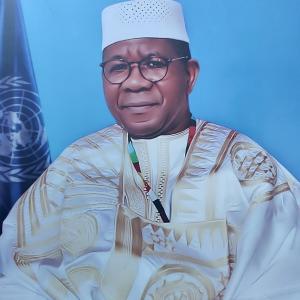I am honoured to represent UNESCO at this momentous Africa Cinema Summit. I would like to express my gratitude to the National Film Authority for their tireless efforts in organizing this event.
Your commitment to harnessing the power of African cinema as a tool for cultural expression, unity, and development is truly commendable.
I would also like to extend a warm welcome to all the attendees and a special mention to the President of the Republic of Ghana, His Excellency Nana Addo Dankwa Akufo-Addo. Your esteemed presence here, Sir, underscores the importance of cinema as a vibrant expression of our culture and its potential to influence our societies.
As we gather here, we are bound by a common purpose: to harness the power of African cinema to tell our stories, from our perspectives, and to share our rich cultural heritage with the world. In Africa, we have a treasure trove of stories waiting to be told, and the world is eager to hear them. We have a unique opportunity to utilize the medium of film to foster understanding, tolerance, and peace among diverse cultures and societies, both within Africa and beyond.
Globally, the creative economy stands as one of the world's fastest-growing sectors, generating annual revenues of US$2,250 billion, with exports surpassing US$250 billion.
This dynamic sector provides employment to nearly 30 million individuals worldwide, and is particularly attractive to the youth, with more people aged 15-29 engaged than in any other industry. In some countries, the contribution of the creative sector can be as significant as 10% of GDP.
Turning our focus to our beloved continent, Africa proudly hosts the world's third-largest movie industry by volume. The film and audiovisual sectors in Africa account for US$5 billion in revenues and provide livelihoods to 5 million people. Looking at the broader horizon, Africa's film and audiovisual industry has the potential to generate US$20 billion in revenues annually, creating over 20 million jobs. This growth can only be achieved if we actively foster collaboration among African nations and promote a conducive environment for local film industries to thrive. Today, only 44.4% of African countries have a film commission, and 35.2% offer financial support to filmmakers. Nurturing the African film industry requires our collective effort, and it is essential to have robust legal frameworks, intellectual property rights protection, and sustainable funding mechanisms.
Yesterday, during a very insightful panel discussion, UNESCO highlighted the importance of safeguarding living heritage and fostering collaborations among the film fraternity on the continent.
Indeed, our living heritage is not just an expression of the past; they are alive and nurturing part of our contemporary societies. They are our stories, our music, our films, in short, the spirit of Africa.
As we seek to enhance the protection and promotion of heritage, it is clear that film plays a critical role. It serves as a canvas where our heritage can come to life, where our stories can captivate audiences, and where our shared values can foster understanding and peace.
UNESCO is strongly committed to promoting the creative industries in Africa. In Ghana, we are supporting the revision of Ghana's Cultural Policy, last updated in 2004, emphasizing the importance of intellectual property rights as a pillar for cultural and creative growth. This initiative actively engages artists, offering them a platform to provide input into the new version of the Cultural Policy of Ghana, ensuring that their rights and creations are safeguarded for the betterment of our cultural and creative ecosystem.
In this era of digital revolution, the power of African cinema to reach a global audience has never been greater. Platforms like Netflix have opened up new avenues for African films to reach millions.
In fact, our recent collaboration with Netflix on the "African Folk Tales Reimagined" initiative showcased the diverse talents of African filmmakers and presented reimagined folktales to a global audience. This initiative not only celebrates and amplifies Africa's rich storytelling heritage but also underscores the potential of the continent's audiovisual sector to create jobs and fuel economic growth.
However, the potential of the African film industry remains largely untapped due to challenges such as piracy and lack of adequate training opportunities. As we work to overcome these challenges, we must also prioritize gender equality in the film industry, promoting and supporting the work of our talented women filmmakers.
Ladies and Gentlemen, it is time for Africa to assert its voice on the global cinema stage. Let us seize this moment to foster collaborations, share resources, and unite in our commitment to create a vibrant African film industry. As we engage in discourse, let us remember that collaboration is the initial step towards peacemaking, and the film serves as the gateway to altering perspectives through powerful stories that connect people from all corners of the world.
Thank you for your attention. Let us make the magic of African cinema shine across the globe.



